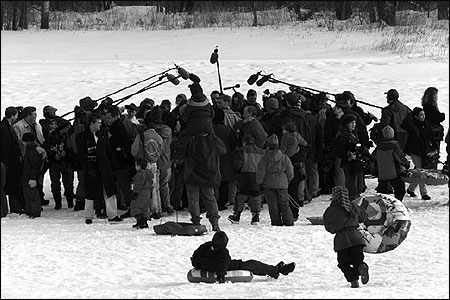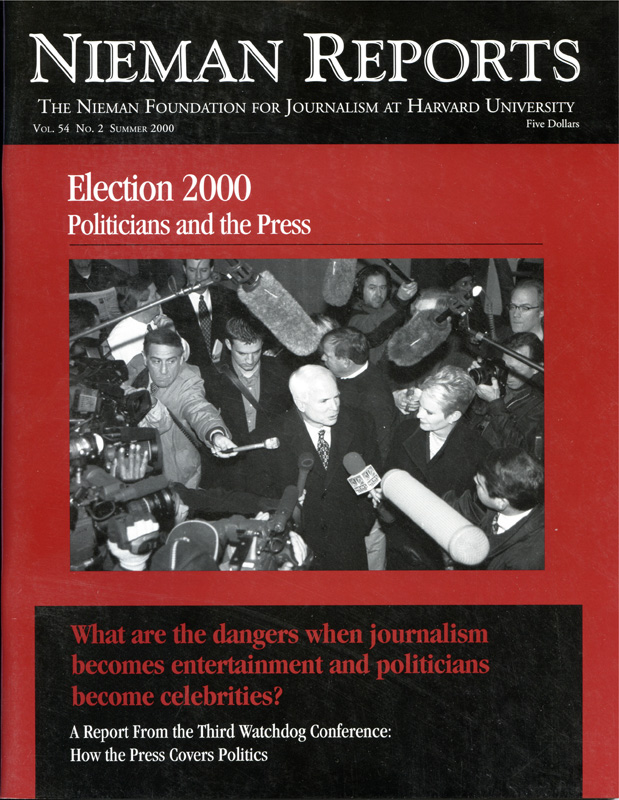
Photo by David L. Ryan, courtesy of The Boston Globe.
One night late in the New Hampshire primary campaign I went to Richard’s Bistro, the restaurant of choice in Manchester these days, with Bill Daley, the Secretary of Commerce, and Charles Campion, a political consultant from Boston. There were two tables of reporters there that night and over the next hour or so two or three of them stopped to speak to Daley. The suspicion crossed my mind, ungenerous though it may have been, that if he provided a quote, he could end up on three or four expense accounts that night.
What struck me most forcefully, however, was that these reporters apparently did not know Chuck Campion, although he probably knows as much about Democratic primaries in the state as anyone in the business. One of Campion’s partners in the Dewey Square Group, Michael Whouley, was serving as field director for Vice President Al Gore, and another, Charlie Baker, was working out of the headquarters applying his expertise from his days as a strategist there for Michael S. Dukakis in 1988. Campion himself went all the way back to 1984, when he ran Walter Mondale’s well managed if unsuccessful operation in New Hampshire.
Nor was this the first time I had such an experience during the primary campaign. Seven months earlier I was in a gaggle of reporters waiting outside an event for George W. Bush when three long-time Republican activists passed by unrecognized.
Neither of these episodes was particularly revealing; you can cover a New Hampshire primary without recognizing Chuck Campion. But we can draw some inferences from these moments about how the nature of political coverage has changed. The first is that the whole concept of the “political reporter” as such is outmoded, at least insofar as the term is applied to the coverage of presidential campaigns today. A generation ago there were a dozen to perhaps 15 of us who covered the national politics beat four years around. We covered not only presidential campaigns but also contests for governor, senate and house seats and occasionally mayor’s offices that were either intrinsically interesting to readers or potentially significant in terms of the national political balance of power. We covered some regional governors’ conferences just to keep in touch with what was happening around the country. We didn’t cover much except electoral politics. Once a candidate took office, many of us lost interest.
Most of us had consultants as sources with whom we had been dealing for several election cycles in several different states. These were people whose company we enjoyed even if we didn’t learn anything over the dinner table or a nightcap in the hotel bar. They helped provide a more developed picture of the candidates and campaigns they represented. Sometimes you could draw valuable inferences from the tone of their conversation. A campaign strategist slipping into the past tense could be revealing. So could consultants fixing blame for things that had gone wrong in a campaign.
Even in the 1980’s, it was also possible to spend some social time with the candidates themselves. Ronald Reagan and Jimmy Carter would have dinner with a political reporter. In the 1984 New Hampshire primary campaign John Glenn was willing to relax with reporters over a Grand Marnier, Gary Hart would share a meal with four or five of us, some of whom had known him in his earlier incarnation as George McGovern’s campaign manager. And even the ostensibly buttoned-up Fritz Mondale might ask you up to his suite for a late night cigar, beer and cheese.
The relationship between reporters and campaigns today is quite different, a casualty of the changes in both the press and politics. These days it seems as if every reporter who has ever covered a debate in the House of Representatives or a city council election shows up in Iowa and New Hampshire.
The presidential primary story is overrun with reporters from niche magazines and camera crews from local television stations and obscure cable news operations. When the State Department arranged a briefing for foreign reporters in New Hampshire, 60 people showed up from places as diverse as Hong Kong and Helsinki. The geometric growth in the size of the press mob, in itself, has changed the nature of the campaign. We are now covering a spectacle we have created ourselves.
The inevitable result is that much of the coverage is derivative, meaning that it plays off of the reporting of a handful of major news organizations. Most of those covering the story have so few firsthand sources they are left to focus their reporting on the same public events that appear on the network television screens every night. Too often it puts them at the mercy of the unfamiliar consultants who trail around after the candidates spinning their purposeful if fanciful descriptions of what is happening.
This doesn’t suggest that the reporters covering campaigns today are any less capable than those from the previous generation who covered the campaigns of Robert F. Kennedy and Richard M. Nixon. On the contrary, those assigned this year have shown impressive drive, discipline and writing skill. They are different, however. Most of them don’t seem to like politicians or their advisors very well, as evidenced by their apparent preference for dining together rather than with a potential source. And few of them plan to make a career out of covering politics. It is a credential on the way to becoming a managing editor or still another talking head on television.
The change in the candidates and the nature of campaigns is every bit as significant as the change in the press corps. Politics is all mechanics. Most candidates are so programmed and scripted that someone who behaves spontaneously, as John McCain did this year, can cause a sensation. Look, Ma, a politician just said what’s on his mind! Indeed, these days campaigns seem to follow formulas written in some backroom laboratory. Everyone has the same objective data from daily tracking polls, as well as whatever wisdom that can be derived from extensive polling and focus groups. If Al Gore suddenly spends an entire day at an elementary school, as he did early this spring, it is safe to infer that the campaign’s polling agrees with that of other polltakers that Gore has particular problems to overcome. Too may voters don’t like him. Too many women in particular don’t like him. George W. Bush is gaining an edge on the education issue. You don’t have to be an expert in political reporting to figure that one out.
The political mechanics are in full control of campaigns. They have learned that most Americans gain their knowledge of politics from what they see on television, either in the form of commercials or the news reports, such as they are, carried by the three broadcast television networks. And they have learned that negative campaigning works. The biggest of the Big Lies eventually will convince enough voters if repeated often enough. Immediately after losing New Hampshire to McCain by 19 percent, Bush spent a weekend in Austin, then emerged from a telephone booth as the “reformer with results”—the implication being that he wasn’t the reformer who tilts at windmills, meaning McCain. The Texas governor kept describing himself in those words, and he made every appearance standing before a large blue curtain bearing those words. Ten days later surveys found that when voters in Republican primaries were asked which of their two candidates represented reform, as many named Bush as McCain. There is no penalty for shamelessness in American politics.
If this is what campaigns are about at the turn of the century, it doesn’t take a political reporter with a wealth of sources to cover them. Anyone can do it.
Jack W. Germond, a syndicated columnist with The (Baltimore) Sun, claims he is covering his last presidential campaign.


